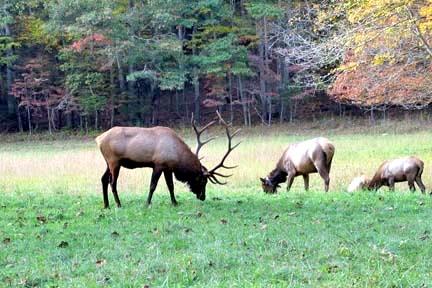The elk restoration project in the Great Smoky Mountains National Park is about to be declared a success. But does that mean their protective status should be removed and that elk should be hunted in North Carolina forests surrounding the park?
Though elk are native to North Carolina, they had been absent from the state since before the 19th century. But the species returned in 2001 when a band of the animals was released in the Cataloochee Valley on the North Carolina side of the national park to kick-start a recovery program. Another band of elk was released in the valley in 2002, as well. Now the herd has grown to more than 100 elk from a start of 52 animals from the two introductions.
Under that recovery program, the elk had been protected from hunters through their listing as a "Special Concern" species by North Carolina wildlife officials. But now the North Carolina Wildlife Resources Commission, a state organization chartered to manage the state's wildlife resources, is moving to remove that classification. This commission, which sets the rules on hunting and fishing in the state, recently issued an updated draft of hunting, fishing, and trapping regulations. In this 24-page document the commission calls for removing elk from the state's list of Special Concern species.
Remove elk (Cervus elephus) from the state’s list of Special Concern species.
Justification: The only free-ranging population of elk in North Carolina was introduced by the National Park Service into the Great Smoky Mountains National Park. The Park Service has indicated to the Commission that they will soon declare their elk-restoration project a success, and elk will no longer be an “experimental population.” Because of the current status of the restoration effort and elk population in western North Carolina, the extra protections afforded Special Concern species are no longer necessary for elk.
The NC Camouflage Coalition, a network of hunters and fishers that is part of the North Carolina Wildlife Federation, opposes the change in protection. They say the designation shouldn't be lifted "until a management plan for elk has been developed and is in place to define the status of elk when they leave the confines of the Great Smoky Mountains National Park. At present, wandering elk are protected as species of special concern; what will be their status if we remove that classification?"
You can weigh in on this debate by going to the North Carolina Wildlife Resources Commission website and registering your concern (see the box in the upper right-hand corner of the site). Better yet, if you live in the area go to one of the open meetings and speak your mind. The proposed regulation is H6 – interesting that they classified it under “hunting."
The last day to comment is Friday, January 22.


 Support Essential Coverage of Essential Places
Support Essential Coverage of Essential Places







Comments
we dont want wolves. yellowstone national park is horrible . there are no elk. the elk are being consumed by wolves at record numbers. Wolves are locust. BAD BAD BAD. Nobody wants the wolves there. SHOOT SHOVEL SHUT UP to the wolves. They have no control of the wolves over there. There will be no elk then. Look at the statics in the park of yellowstone you will see that I dont lie. WOLVES and ELK dont mix. Bad combo. Hunters in a controlled huntis the way to go. PLEASE NO WOLVES. I DONT LIE=WOLVES BAD.
When I was at Yellowstone I saw no shortage of elk. Wolves and elk do mix and have mixed for thosands of years. The goal of the NPS is to protect the parks. As such they should restore the parks to how they were before human intervention. Also i would like to point out that the wolves that are native to the Smokys are red wolves not the gray wolves of Yellowstone.
I SAY NO TO WOLVES. WOVLES ARE PRETTY. PRETYY DEVISTATING TO HERD POPULATION. THEY WILL KILL ALL THE ELK. NO WOLVES
No elk in Yellowstone?
Someone must have forgotten to tell the elk. They don't seem to know that they are gone.
When hunting I am most concerned that the species being hunted and harvested are done with hunting laws that are designed to positively assure that the targeted species remains viable,strong and healthy. This means not just killing the biggest strongest most fit animals (trophy). The legal ethical constraints of hunting should complement that.
All hunters are not created equal and dont have the same hunting skills. That is why we have outfitters, guides etc.
Seems to me that the NC population of elk needs to be a lot larger before a season starts. If there is a healthy population some animals will be quickly killed the first year. The animals that survive will become increasingly more difficult to kill and the better hunters will become the successful hunters.
Just make them permit hunts, harvests for you who think you're farming elks... I'd pay 1 dollar a pound for a hunt, tomorrow.